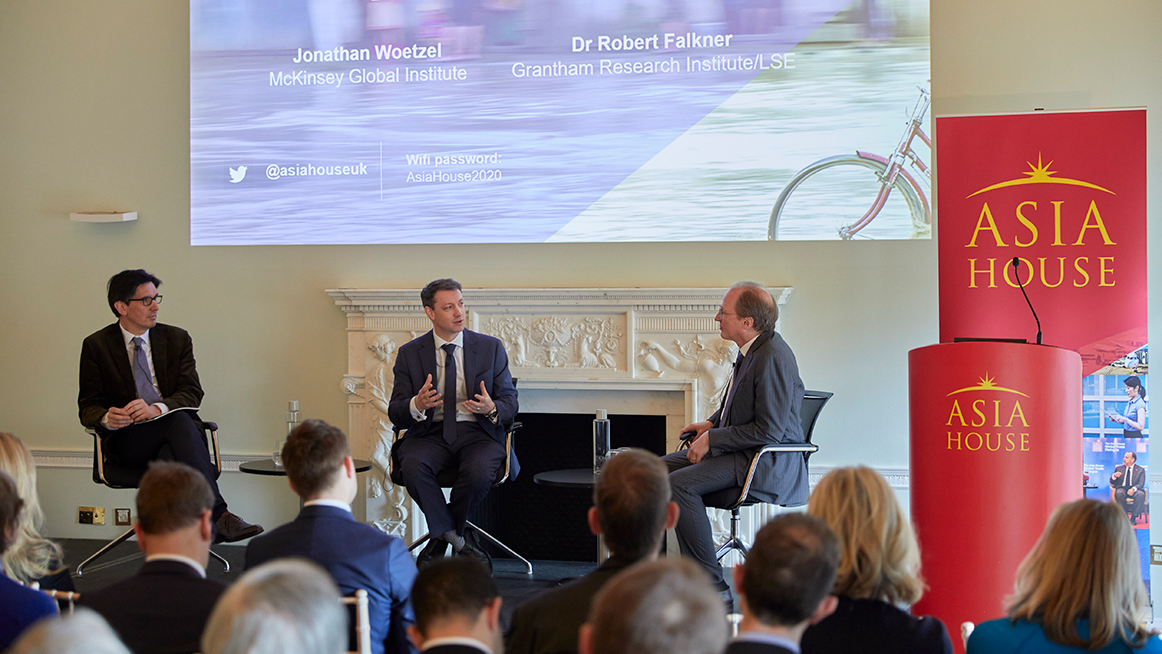Driving commercial and political engagement between Asia, the Middle East and Europe
Driving commercial and political engagement between Asia, the Middle East and Europe
Driving commercial and political engagement between Asia, the Middle East and Europe

As the effects of climate change worsen worldwide, more will have to be done to improve the sustainability and resilience of our societies, according to global thought leaders speaking at Asia House.
The risks of climate change are “no longer either imaginary or hypothesised, modelled or happening sometime in the future,” Robert Falkner, Research Director of the Grantham Research Institute on Climate Change and the Environment at the LSE, said during a conference held in partnership with McKinsey & Company.
“They are happening right now.”
Economies, investors, companies and regulators need to up the pace and scale of adaption significantly in order to mitigate developing climate risks, which will also involve choices being made at a higher policy level, the conference heard.
Speaking on a panel with McKinsey Global Institute’s Director and Senior Partner, Jonathan Woetzel, Falkner said that climate change is a much bigger conversation today compared to 10 or 20 years ago, when it was seen as a “fringe debate”. While this gives him “hope”, Falkner warned that people are not yet taking the issue as seriously as they could be.
People do not fully feel that they are in a state of crisis, Woetzel said, which is preventing the implementation of necessary climate risk measures.
Currently, it’s the countries which are already experiencing the impact of climate change who are more willing to adapt, Woetzel argued. “China and Asia more generally will be at the centre of this change, that behavioural shift.”
However, single countries taking action will not make enough of a difference.
“It’s a collective challenge. Whatever we do here or in the United States, or whatever China does, is neither here nor there unless everyone more or less joins in.”
Falkner argued that, although the Paris Agreement gives the global community a target and a framework for climate action, it is now down to the individual countries to take action in their own domestic contexts. We need to get to “net zero by or before 2050” in terms of global emissions, he emphasised.
Woetzel highlighted the varied responses from different sectors, some of which will need encouragement to take action. Climate change risk is now “part of the business model for finance,” but the infrastructure community is “a little slower,” he said. Where regulation may be necessary in the automotive sector, other sustainability measures – such as market pricing, general sentiment, talent or innovation – may work elsewhere.
Meanwhile, Falkner urged people to consider introducing “a proper carbon price that reflects the urgency of the task,” arguing that this has not been tried properly.
When an audience member pointed out that China is funding of carbon intensive energy production as a part of their Belt and Road Initiative, Woetzel said they are right to be called out. However, he added that Beijing could play “a more constructive role by engaging on a multilateral basis.”
Whether this is through the Multilateral Investment Guarantee Agency or through other institutions, such as the Asian Infrastructure Investment Bank, Woetzel said they could come up with a code of conduct and standards to “define what is green infrastructure or green production and that’s where China can make a step forward and demonstrate actual leadership”.
Falkner pointed out that “China is not alone in facing those difficult challenges”, as Britain is also still using foreign aid to fund some fossil fuel energy projects in the developing world.
“It doesn’t really matter what you focus on, you just need to try everything,” Falkner said. “I think we just need to get going and start now across the board.”
The discussion was part of the Climate Risk and Response conference, held at Asia House in partnership with McKinsey & Company on 6 March 2020.
